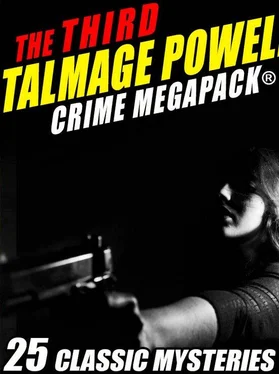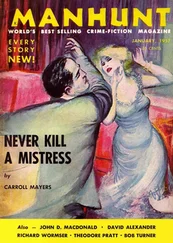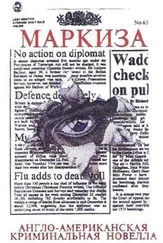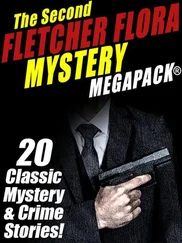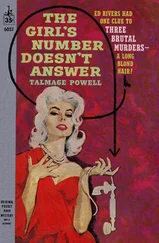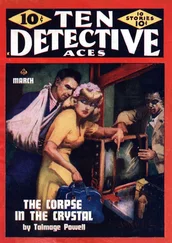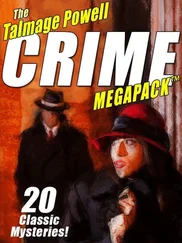The two had had a last quarrel. According to Janice Carter’s maid, the red-haired commercial artist had railed at Robert that he look at himself, soft as cheese, well trained as a lap dog, afraid to lose the soft berth that had decayed him. Robert must have awakened under the sting of her words, packed a bag, returned to her cottage, only to find her body down on the beach.
The winds howled through Dorothy’s mind now, listening to them. In his way, Robert must have loved Janice intensely, for her death sent him clear out of his mind. All his paintings were found in his house, ripped to shreds. All that saved his wife was his thought he’d killed her when he struck her head against the patio pillar. He’d left her sheltered there, the carving knife at her side.
Robert? Dorothy Janeway thought. There was a phrase she tried to remember, something about the Gods first making mad whom they would destroy.
Tears stung her lids, a faint moan escaped her lips.
“Dorothy! Darling, this is Sue. I’m taking you home with me. Everything is all right. Doctor, she’s coming out of it. Can you hear me, Dorothy? How do you feel, darling?”
Dorothy Janeway opened her eyes.
“Feel?” she whispered. “I feel like a very hollow rusty little tin god...”
“Delirious,” said Mr. Conlan with a frown. “Well, I can always come back later.”
Originally published in Smashing Detective Stories , March 1952.
The morgue-keeper was wizened and so bald his head looked like a glazed skull in the white, cold light of the morgue. He pulled the drawer out, wiped his colorless lips with the back of his hand, and said, “Well, there she is, boys. Pretty little trick in life — but she don’t look so hot now, eh?”
David Archer and I looked at the corpse. The keeper was right. She had been a pretty little trick in life — so pretty it tore your throat to look at her now. She’d been blonde with a heart-shaped face that was only beginning to harden; time must have been when, her blue eyes held trust, merriment, love of life. But the years had made her eyes hard, sardonic; now here in the morgue, her eyes held nothing. They were blue chips of cold glass staring unseeingly at the skylight overhead. Her name was Marilyn Foster; she had been killed with a crushing blow against her left temple.
Archer nodded, and the morgue-keeper shot the heavy drawer closed on its steel rollers. The keeper strolled with us toward the double, glazed-glass doors of the morgue. “That’s the way they all go,” He said with the tone of an old man who has seen too much death. “Marilyn Foster. I wonder what her pa and ma were like? She must have been a nice girl once, but she was poor, wasn’t she? Poor, and the war came along, and there was a lot of loose money — the excitement did something to a lot of girls like her. They thought they was having fun, hump! Next thing you know they’re regular little chits hustling drinks in any bar or club that’ll give ’em a percentage. Once on the go-round, they never learn to calm down.
“What’s you guys’ angle on this, eh, Archer? They got the guy that did it yet? They going to give him the old one-two into the chair? They...”
“Shut up!” David Archer said, in a tone so cold it froze the morgue-keeper in his tracks.
We left the bright, harsh gloom of the morgue, crossed the street to headquarters, and walked back to Lieutenant Tim Brogardus’ office. We could hear the babble of voices before we opened the door.
There were three men in the office. Tim Brogardus sat at his desk, a big, hound-faced man, who carried a mournful look in his eyes. According to the chief’s way of thinking, Brogardus had the voice of a lion and the brain of a gnat. But Tim’s roughshod, direct methods of police work often got results, and there was mutual respect between him and Archer: two men poles apart, each seeing in the other qualities alien to his own that he could respect.
At the end of Tim’s desk, visibly shaken, sat Buddy VanDyke, II. Slender, trim, Buddy had a childish face, black hair that came to a widow’s peak on his forehead, dark brown eyes, and a chin that was quivering. Women were crazy over him. I guess he appealed to the maternal in them with that chin; he had been crazy about Marilyn Foster.
In the leather chair against the windows sat Lon Montague. Lon had that compact build, without being beefy, that means real physical power. Under pale sandy hair that was thinning from a high forehead, he had dark, very-alive eyes that missed nothing. He also had a square, blunt chin that didn’t quiver. He owned the Starlight Club, and Marilyn Foster had been working for him at the time of her death.
Brogardus looked at the chief.
“Anything more you can add after seeing her, Archer?”
David Archer shook his head. “I’ve told you everything I know. The case is over for us; it’s your baby now, Tim. We’re strictly out of it. Old Ludwig VanDyke hired us to scare Marilyn Foster off his grandson,” the chief glanced at Buddy’s quivering chin, “or get something on her that would break up the affair. We didn’t like the case from the beginning. It was no newer, no less sordid than half a hundred others we’ve handled — the poor, dumb, but beautiful hat-check girl making a play for the weak, young rich boy, while in the background the old bear of the clan didn’t like it.”
Buddy VanDyke fastened his eyes on the chief, and came out of his chair in a slow, way that crimped silence on the room. “You keep your mouth shut about her!”
“Sit down, VanDyke,” the chief suggested.
Buddy didn’t sit down. He moved over close to Archer; he was trembling and sweat gave his face a pasty look. “You damned shamus!” he shouted. “Why couldn’t you have left her alone? She wasn’t greedy! She was good — you hear me? She was good!”
Archer looked suddenly weary. “You weak fool,” he said, spacing the words with intervals of silence between each one, “there might have been a time when she was good, years ago. But she made herself what she was; she was grasping, and life had taught her to be slick. She didn’t want anything but your money; sonny boy; if she actually loved anybody it was Lon Montague.”
Montague didn’t flicker a lash. Buddy VanDyke clenched his fists, looked from Archer to Montague, and sat down. After a moment, I realized sobs were knotting in his belly. “You’re all wrong about her! We were going to be married today. At high noon,” he whispered, “in City Hall — and then we were going away — only now she’s across the street in the morgue!” He buried his face in his hands, and the office got very uncomfortable with the sounds that wretched out of him.
We exchanged glances. Brogardus muttered, “Lay off him, Archer!”
The chief shrugged, sighed. Montague stood up. “If there’s nothing more you need me for...” he suggested quietly.
“I’ll call you,” Brogardus said.
Archer, Montague, and I went outside. The air on the sidewalk seemed clear and clean; I needed the rays of the dying, late afternoon sun to warm me.
Montague gave his hat-brim an extra tug. “Can I drop you someplace?”
“Thanks, no,” Archer said. “Jordan and I will have to tell the old bear that he needn’t worry about her any longer.”
As we turned away, Montague’s voice arrested us, “Archer!”
“Yeah?”
“While you were digging in her life, did you stumble across anything that might trip up whoever killed her?”
Archer didn’t reply.
Montague’s eyes shimmered faintly. “Okay, so anything you learned is not to be discussed in public. I was thinking...”
“Anything I learned, Montague, I have already told Brogardus — in private. Brogardus will handle Marilyn Foster’s killing in the proper, legal way.”
Читать дальше
